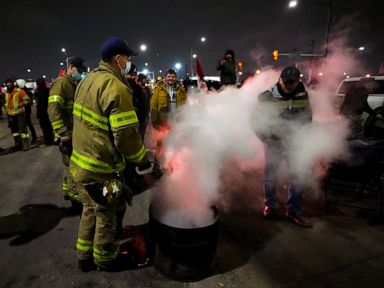
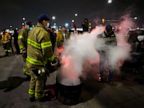

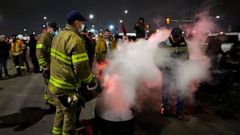
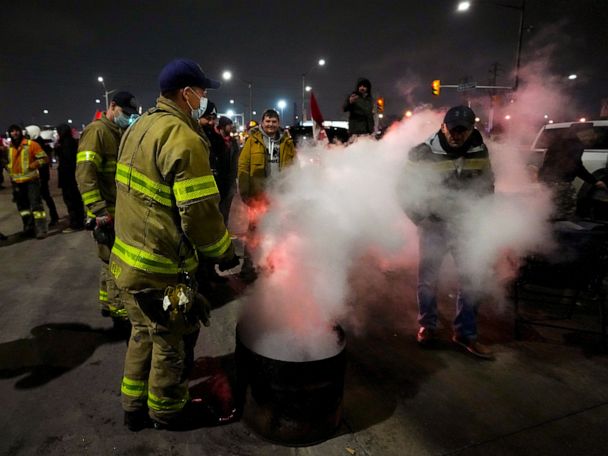
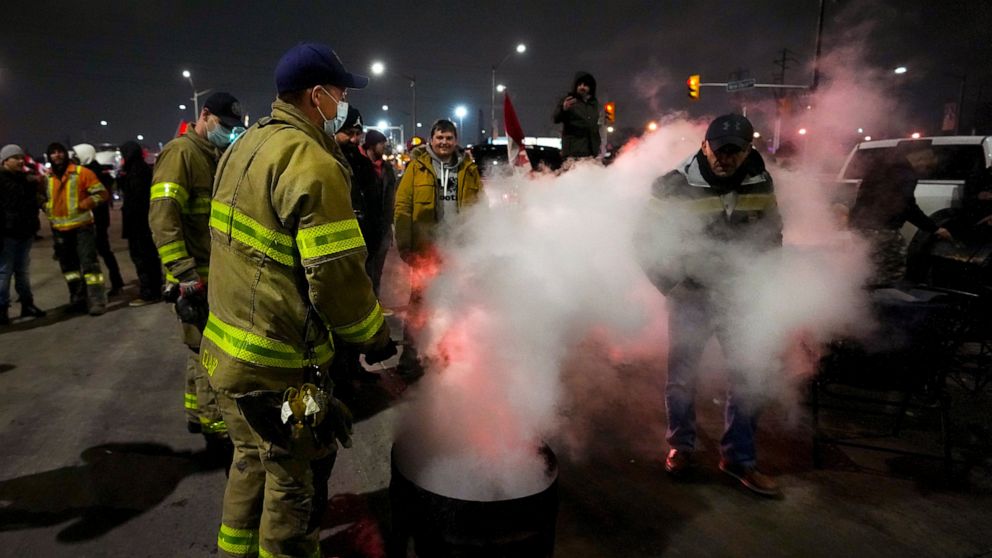

TORONTO — The truck blockade by Canadians protesting the country’s COVID-19 restrictions is tightening the screws on the auto industry, forcing Ford, General Motors and other car companies to shut down plants or otherwise scale back production on both sides of the U.S. border.
The bumper-to-bumper demonstration by the self-proclaimed Freedom Convoy entered its fourth day Thursday at the Ambassador Bridge connecting Windsor, Ontario, to Detroit, disrupting the flow of auto parts and other products between the two countries.
With political and economic pressure mounting, Windsor Mayor Drew Dilkens announced the city will seek a court injunction to end the occupation by scores of truck drivers.
“The economic harm is not sustainable and it must come to an end,” he said.
Meanwhile, the U.S. braced for the possibility of similar truck-borne protests inspired by the Canadians, and authorities in Paris and Belgium banned road blockades to head off disruptions there, too.
The U.S. Department of Homeland Security said in a bulletin to local and state law enforcement agencies that it has received reports that truckers are planning to “potentially block roads in major metropolitan cities” in a protest against vaccine mandates and other issues.
The agency said the convoy could begin in Southern California as early as this weekend, possibly disrupting traffic around the Super Bowl, and reach Washington in March in time for the State of the Union, according to a copy of Tuesday’s bulletin obtained by The Associated Press.
The ban on road blockades in Europe and the threat of prison and heavy fines were likewise prompted by online chat groups that have been calling on drivers to converge on Paris starting Friday night and to continue on to Brussels on Monday.
The Ambassador Bridge is the busiest U.S.-Canadian border crossing, carrying 25% of all trade between the two countries, and the effects of the blockade there were felt rapidly.
Ford said its Windsor, Ontario, engine plant reopened Thursday after being shut down on Wednesday because of a lack of parts. But the factory and the company’s assembly plant in Oakville, Ontario, near Toronto, were operating at reduced capacity, the automaker said.
On the U.S. side, GM canceled the second shift on Wednesday and the first and second on Thursday at its SUV factory outside Lansing, Michigan.
Toyota said three of its plants in Ontario, Canada, closed for the rest of the week because of parts shortages, and production also had to be curtailed in Georgetown, Kentucky.
Workers on the morning shift at a Windsor minivan plant operated by Stellantis, formerly Fiat Chrysler, were sent home early.
Michigan Gov. Gretchen Whitmer urged Canadian authorities to quickly resolve the standoff, saying: “It’s hitting paychecks and production lines. That is unacceptable.”
Hundreds of demonstrators in trucks have also paralyzed the streets of downtown Ottawa for almost two weeks now and maintained blockades at two border crossings besides Windsor — at Coutts, Alberta, opposite Montana, and at Emerson, Manitoba, across from North Dakota.
The protesters are decrying vaccine mandates for truckers and other COVID-19 restrictions and railing against Prime Minister Justin Trudeau, even though many of Canada’s precautions, such as mask rules and vaccine passports for getting into restaurants, theaters and other places, were enacted by provincial authorities, not the federal government, and are already rapidly being lifted as the omicron surge levels off.
Trudeau continued to stand firm against lifting vaccine mandates, including a requirement that all truck drivers entering the country be fully vaccinated.
But because an estimated 90% of the nation’s truck drivers are already vaccinated, some conservatives have called on Trudeau to drop the mandate.
The convoy has been promoted and cheered on by many Fox News personalities and attracted support from the likes of former President Donald Trump and Texas Sen. Ted Cruz.
The Associated Press identified more than a dozen Facebook groups encompassing roughly a half-million members that are being used to drum up support for the Canadian protests or plan similar ones in the U.S. and Europe.
To get around the blockade and into Canada, truckers in the Detroit area have had to drive 70 miles north to Port Huron, Michigan, and cross the Blue Water Bridge, where there was a 4½-hour delay leaving the U.S.
Pandemic restrictions have been far stricter in Canada than in the U.S., but Canadians have largely supported them. Canada’s COVID-19 death rate is one-third that of the U.S.
Canada’s opposition Conservative Party began calling for the blockades to end after its lawmakers initially supported the protests. Trudeau accused the Conservatives of endorsing and enabling the demonstrations.
————
Krisher reported from Detroit. AP writers Ben Fox and Amanda Seitz contributed from Washington.
Truck blockade at U.S.-Canadian border shuts auto plants
Updates Viral PH

0 Comments